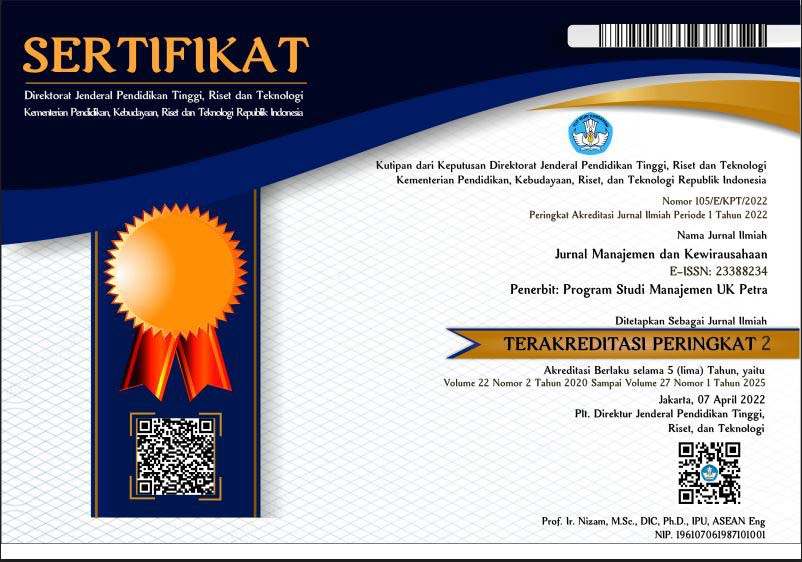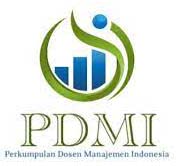MEASURING THE ENTREPRENEUR’S FINANCIAL KNOWLEDGE: EVIDENCE FROM SMALL MEDIUM ENTERPRISES IN SURABAYA
 :
:
https://doi.org/10.9744/jmk.18.2.132–144
Keywords:
Financial knowledge, entrepreneurial finance, entrepreneur, small medium enterprisesAbstract
This study aimed to analyze the factors that measure the financial knowledge of entrepreneurs in Surabaya. Entrepreneurs with higher financial knowledge will have a growing probability of a successful business. This research was conducted by distributing questionnaires. There are 309 entrepreneurs as the sam-ples who are living, doing business, as well as having financial knowledge about entrepreneurial finance in Surabaya. This study used exploratory factor analysis to identify the relationship between the manifest varia-bles (attributes) or indicator variables to build a construct (factor). The results in this study are the factors that measure the financial knowledge of entrepreneurs in SMEs such as functional financial management sys-tems, funding decisions, business information technology, financial obstacles, financial strength, and risk ma-nagement.References
Abanis, T., Sunday, A., Burrani, A., & Eliabu, B. (2013). Financial management practices in small and medium enterprises in selected districts in Western Uganda. Research Journal of Finance and Accounting. 4(2), 29–42.
Alessie, R., Lusardi, A., & Rooij, M. V. (2007). Financial literacy and stock market participation. NBER Working Paper. No. 13565.
Amoako, G. K. (2013). Accounting practices of SMEs: A case study of Kumasi Metropolisin Ghana. International Journal of Business and Management, 5(10), 3781–3793.
ANZ (2008). Survey of adult financial knowledge in Australia. Retrieved February 17, 2015, from http://www.anz.com/Documents/AU/Aboutanz/AN_5654_Adult_Fin_Lit_Report_08_Web_Report_full.pdf.
ANZ (2011). Adult financial knowledge in Australia. Retrieved February 11, 2015 from http://www. financialknowledge.gov.au/media/465153/2011adultfinancialknowledgefull.pdf.pdf.
Banks, J. & Oldfield, Z. (2007). Understanding pensions: cognitive function, numeracy, and retirement savings. Fiscal Studies. 28, 143–170.
Benjamin (2015). Solusi jitu tingkatkan indeks literasi keuangan Indonesia. Retrieved September, 25 2016 from http://bisnis.news.viva.co.id/news/ read/618426solusijitutingkatkanindeksliterasikeua nganindonesia.
Borden, L. M., Lee, S. A., Serido, J., & Collins, D. (2008). Chaninging college student’s financial knowledge, attitudes, and behaviour through seminar participation. Journal of Family Economic Issues. 29(1), 23–40.
Bruhn M. & Zia, B. (2011). Stimulating managerial capital in emerging markets: The impact of business and financial knowledge for young entrepreneurs. World Bank Working Paper. Retrieved February 12, 2015 from http://econ. worldbank. org/external/default/main? page.
Campbell, J. (2006). Household finance. Journal of Finance. 61, 1553–1604.
Carswell, A. T. (2009). Does housing counselling change consumer financial behaviors? Evidence from Philadelphia. Journal of Family and Economics Issues. 30(4), 339–356.
Collins, J. M. (2007). Exploring the design of financial counselling for mortgage borrowers in default. Journal of Family and Economic Issues. 28(2), 207–226.
Dahmen, P., & Rodriguez, E. (2014). Financial literacy and the success of small business: An observation from a small business development center. Numeracy. 7(1), 1–12.
DemirgucKunt, A., Maksimovic, V., Beck, T., & Laeven, L. (2006). The determinant of financial obstacles. International Journal of Money and Finance. 25(6), 932–952.
Fatoki, O. (2014). The financial knowledge of micro entrepreneurs in South Africa. Journal Social Science, 40(2), 151–158.
Ghozali, I. (2005). Aplikasi analisis multivariate dengan program SPSS. Semarang, Indonesia: UNDIP.
Hasan, S. (2014). Kemenkop berambisi cetak 960.000 pengusaha di 2014. Retrieved February 11, 2015 from http://www.kabarbisnis.com/read/ 2845319.
Hilgert, M. A., Hogarth, J. M., & Beverly, S. G. (2003). Household financial management: The connection between knowledge and behaviour. Federal Reserve Bulletin, 309–322.
Iqbal, M. & Hazliansyah. (2014). BPS: Jumlah wirausahawanwan meningkat. Retrieved February 11, 2015 from http://www.republika.co.id/ berita/ekonomi/makro/14/05/06/n54k9pbpsjumlahwirausah awanwanmeningkat.
Leach, J. C. & Melicher, R. W. (2012). Entrepreneurial finance. 5th Edition. Cengage Learning.
Lemeshow, S., Hosmer, D. W., Klar, J., & Lwanga, S. K. (1990). Adequacy of sample size in health studies. John Wiley & Sons. England.
Lusardi, A., & Mitchell, O. S. (2007). Baby boomer retirement security: The roles of planning, financial literacy, and wealth. Journal of Monetary Economics. 54, 205–224.
Lusardi, A. & Tufano, P. (2009). Debt literacy, financial experiences, and overindebtedness (No. w14808). National Bureau of Economic Research.
Manly, B. F. J. (2005). Multivariate statistical methods: A primer. Third Edition. Chapman and Hall/CRC. Florida.
Mendari, A. S. & Kewal, S. S. (2013). Tingkat literasi keuangan di kalangan mahasiswa STIE MUSI. Jurnal Economia, 9(2), 130–140.
Mitchell, O. S. & Lusardi, A. (2015). Financial literacy and economic outcomes: Evidence and policy implications. The Journal of Retirement. 3(1), 107–114.
Mitchelmore, S., & Rowley, J. (2013). Entrepreneurial competencies of women entrepreneurs pursuing business growth. Journal of Small Business and Enterprise Development. 20(1), 125–142.
Moore, D. (2003). Survey of financial literacy in Washington State: Knowledge, behaviour, attitudes, and experiences. SESRC Technical Report, 03–39.
Naqvi, S.W.H. (2011). Critical success and failura factors of entrepreneurial organizations: Study of SMEs in Bahawalpur. Journal of Public Adminstration and Governance. 1(2), 17–22.
Oseifuah, E.K. (2010). Financial knowledge and youth entrepreneurship SMEs in South Africa. African Journal of Economic and Management Study. 1(2), 164–182.
Otoritas Jasa Keuangan. (2013). Literasi keuangan. Retrieved from September 25, 2016 from http:// www.ojk.go.id/id/kanal/edukasidanperlindungankonsumen/Pages/LiterasiKeuangan.a spx.
Perry, V. G. & Morris, M. D. (2005). Who is in control? The role of selfperception, knowledge, and income in explaining consumer financial behaviour. The Journal of Consumer Affairs. 39(2), 299–313.
Porter, N. M. & Garman, E. T. (1993). Testing a conceptual model of financial wellbeing. Journal of Financial Counselling and Planning. 4, 135–164.
Puspayoga. (2015). Jumlah pengusaha Indonesia hanya 165 persen. Retrieved March 12, 2015 from http://www.republika.co.id/berita/nasional/ umum/15/03/12/nl3i58jumlahpengusahaindonesiahanya165persen.
Rismaharini, T. (2014). Risma terkejut pertumbuhan UMKM Surabaya. Retrieved February 11, 2015 from http://www.enciety.co/rismaterkejutpertumbuhanjumlahumkmsurabaya/.
Robb, C. A. & Sharpe, D. L. (2009). Effect of personal financial knowledge on college students’ credit card behaviour. Journal of Financial Counselling and Planning. 20(1), 25–40.
Robb, C. A. & Woodyard, A. S. (2011). Financial knowledge and best practice behavior. Journal of Financial Counseling and Financial Planning, 22(1), 60–70.
Ross, S. A., Westerfield, R., & Jordan, B. D. (2008). Corporate finance fundamentals. United State: Mc GrawHill/Irwin.
Santoso, S. (2002), SPSS statistik multivariat. Jakarta: PT Alex Media Komputerindo.
Sebstad, J., Cohen, M., & Stack, K. (2006). The outcomes of financial education. Working Paper No.3.
Sucuahi, W. T. (2013). Determinants of financial literacy of micro entrepreneurs in Davao City. International Journal of Accounting Research. 1(1), 44–51.
The United States Agency for International Development. (2009). Development of strategy options for SME financial knowledge. Retrieved February 12, 2015 from http://pdf.usaid.gov/pdf_docs/ PNA DP093.pdf.
Tijani, O. M. & Mohammed, A. K. (2013). Computerbased accounting systems in small and medium enterprises: Empirical evidence from a randomized trial in Nigeria. Universal Journal of Management. 1(1), 13–21.
United State Department of Veteran Affairs. (2013). VA financial policies and procedures. Vol 1, Chapter 4. Retrieved February 22, 2015 from http://www.va.gov/finance/docs/vafinancial policyvolu meichapter04.pdf.
Warue, B. N. & Wanjira, T. V. (2013). Assessing budgeting process in small and medium enterprises in Nairobi’s central business district: A case of hospitality industry. International Journal of Information Technology and Business Management. 17(1), 1–11.
Wise, S. (2013). The Impact of financial knowledge on new venture survival. International Journal of Business and Management, 8(23), 30–39.
Downloads
Published
How to Cite
Issue
Section
License
Authors who publish on this journal agree to the following terms:
- Authors retain copyright and grant the journal right of first publication with the work simultaneously licensed under a Creative Commons Attribution License that allows others to share the work with an acknowledgement of the work's authorship and initial publication in this journal.
- Authors are able to enter into separate, additional contractual arrangements for the non-exclusive distribution of the journal's published version of the work (e.g., post it to an institutional repository or publish it in a book), with an acknowledgement of its initial publication in this journal.
- Authors are permitted and encouraged to post their work online (e.g., in institutional repositories or on their website) prior to and during the submission process, as it can lead to productive exchanges, as well as earlier and greater citation of published work (See The Effect of Open Access).

















